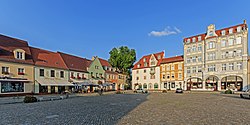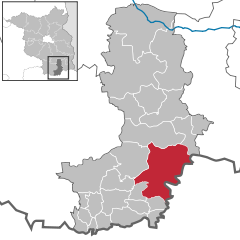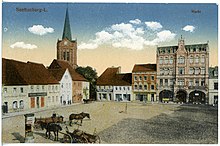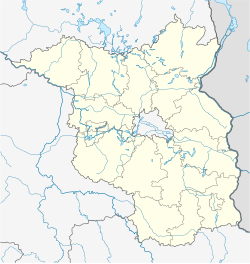Senftenberg
Senftenberg Zły Komorow | |
|---|---|
 Market Square | |
Location of Senftenberg Zły Komorow within Oberspreewald-Lausitz district  | |
| Coordinates: 51°31′N 14°01′E / 51.517°N 14.017°E | |
| Country | Germany |
| State | Brandenburg |
| District | Oberspreewald-Lausitz |
| Government | |
| • Mayor (2022–30) | Andreas Pfeiffer[1] (CDU) |
| Area | |
• Total | 127.56 km2 (49.25 sq mi) |
| Elevation | 102 m (335 ft) |
| Population (2022-12-31)[2] | |
• Total | 23,405 |
| • Density | 180/km2 (480/sq mi) |
| Time zone | UTC+01:00 (CET) |
| • Summer (DST) | UTC+02:00 (CEST) |
| Postal codes | 01945 (Peickwitz), 01968 (Brieske, Großkoschen, Niemtsch, Sedlitz, Senftenberg), 01996 (Hosena) |
| Dialling codes | 03573, 035756 (Hosena, Peickwitz) |
| Vehicle registration | OSL, CA, SFB |
| Website | www.senftenberg.de |
Senftenberg (German) or Zły Komorow (Lower Sorbian, pronounced [ˈzwɨ ˈkɔmɔrɔw]) is a town in Lower Lusatia, Brandenburg, in eastern Germany, capital of the Oberspreewald-Lausitz district.
Geography
[edit]Senftenberg is located in the southwest of the historic Lower Lusatia region at the border with Saxony. Its town centre is situated north of the river Black Elster and the artificial Senftenberger Lake, part of the Lusatian Lake District chain, approximately 20 kilometres (12 mi) northwest of Hoyerswerda, and 35 kilometres (22 mi) southwest of Cottbus.
Senftenberg station is north of the centre and a major railway freight yard is located to its north-east, with a locomotive depot.
History
[edit]
Senftenberg was first mentioned in a 1279 deed issued by Henry III the Illustrious of Wettin, then margrave of Lusatia. In 1319, the town became part of the Duchy of Jawor, the southwesternmost duchy of fragmented Piast-ruled Poland.[3][4] In 1346 it passed to the Bohemia, then in 1350 to the Margraviate of Brandenburg.[5] With Lower Lusatia, the settlement was re-acquired by the Kingdom of Bohemia under Charles IV of Luxembourg in 1368. The town was located on a trade route connecting Leipzig with Poland.[6] Elector Frederick II of Saxony acquired Senftenberg in 1448, whereafter the area as a border stronghold of the House of Wettin was separated from Bohemian Lusatia, until in 1635 all Lusatian territories fell to Saxony by the Peace of Prague.
During the Great Northern War, in 1701, troops marched through the town towards Poland.[7] In 1704, the defensive walls were strengthened against a possible Swedish attack.[8] According to the 1815 Congress of Vienna, Lower Lusatia was annexed by Prussia and incorporated into the Province of Brandenburg. During World War II, the present-day district of Großkoschen (Kóšyna) was the location of a subcamp of the Gross-Rosen concentration camp, in which some 850 men, including Soviet citizens and Poles, were imprisoned.[9] From 1952 to 1990, it was part of the Bezirk Cottbus of East Germany.
Names
[edit]- Czech: Zlý Komorov
- German: Senftenberg
- Polish: Zły Komorów
- Upper Sorbian: Zły Komorow
- Lower Sorbian: Zły Komorow
Lake Senftenberg
[edit]Lake Senftenberg is a popular tourist destination. In 1973, the former open cast mine, was officially opened to the public. Today, the lake is known for its excellent water quality. It is part of the so-called Lusatian Lakeland, a group of 23 artificial lakes.
Demography
[edit]After the second half of the 19th century the inhabitants increased because of workers coming to Senftenberg to work in the coal mines. After the German Reunion, many inhabitants moved to the western part of Germany.
-
Development of Population since 1875 within the Current Boundaries (Blue Line: Population; Dotted Line: Comparison to Population Development of Brandenburg state; Grey Background: Time of Nazi rule; Red Background: Time of Communist rule)
-
Recent Population Development and Projections (Population Development before Census 2011 (blue line); Recent Population Development according to the Census in Germany in 2011 (blue bordered line); Official projections for 2005–2030 (yellow line); for 2017–2030 (scarlet line); for 2020–2030 (green line)
|
|
|
Sport
[edit]In Senftenberg is the soccer club FSV Glückauf Brieske-Senftenberg. They currently play at the Elsterkampfbahn but previously played at the former Glück-Auf Stadium (known as the Old Stadium). It opened on 4 November 4, 1953, when 33,000 fans showed up for the inaugural match against Torpedo Moscow.[11] It also hosted motorcycle speedway and was the venue for a qualifying round of the 1966 Speedway World Team Cup.[12] The old stadium on Briesker Straße was torn down in 1997 and is marked by the housing on the "Im alten Stadion" road.
Twin towns – sister cities
[edit]Senftenberg is twinned with:[13]
 Fresagrandinaria, Italy
Fresagrandinaria, Italy Nowa Sól, Poland
Nowa Sól, Poland Püttlingen, Germany
Püttlingen, Germany Saint-Michel-sur-Orge, France
Saint-Michel-sur-Orge, France Senftenberg, Austria
Senftenberg, Austria Veszprém, Hungary
Veszprém, Hungary Žamberk, Czech Republic
Žamberk, Czech Republic
Notable people
[edit]- Hermann Kuhnt (1850–1925), ophthalmologist
- Herbert Windt (1894–1965), composer
- Joachim Sauer (born 1949), chemist and professor
Gallery
[edit]-
Old Town
-
Estate housing
-
Lutheran church
in "Jüttendorf"
References
[edit]- ^ Landkreis Oberspreewald-Lausitz Wahl der Bürgermeisterin / des Bürgermeisters, accessed 13 November 2022.
- ^ "Bevölkerungsentwicklung und Bevölkerungsstandim Land Brandenburg Dezember 2022" (PDF). Amt für Statistik Berlin-Brandenburg (in German). June 2023.
- ^ Paulitz, Johann Gottlob. Chronik der Stadt Senftenberg und der zum ehemaligen Amte Senftenberg gehörigen Ortschaften (in German). Dresden. p. 67.
- ^ Bogusławski, Wilhelm (1861). Rys dziejów serbo-łużyckich (in Polish). Petersburg. p. 142.
{{cite book}}: CS1 maint: location missing publisher (link) - ^ Paulitz, pp. 69–70
- ^ Pieradzka, Krystyna (1949). "Związki handlowe Łużyc ze Śląskiem w dawnych wiekach". Sobótka (in Polish). IV (4). Wrocław: 90.
- ^ Paulitz, p. 231
- ^ Paulitz, pp. 232–233, 239
- ^ "Subcamps of KL Gross-Rosen". Gross-Rosen Museum in Rogoźnica. Retrieved 16 October 2023.
- ^ Detailed data sources are to be found in the Wikimedia Commons.Population Projection Brandenburg at Wikimedia Commons
- ^ "Kampfbahn Glück-Auf - Senftenberg-Brieske". Europlan. Retrieved 28 January 2024.
- ^ "1966 Speedway World Cup". International Speedway. Retrieved 28 January 2024.
- ^ "Senftenberger Städtepartnerschaften". senftenberg.de (in German). Senftenberg. Retrieved 2021-03-25.
External links
[edit]- Official website
 (in German)
(in German)










